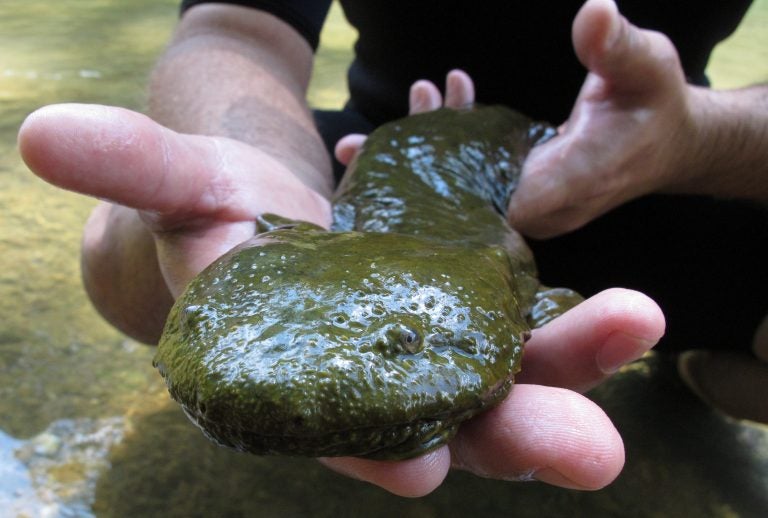Eastern hellbender voted Pennsylvania’s official amphibian
The House voted 191-6 Tuesday to grant the honor to the Eastern hellbender, which can grow to be more than 2 feet (a half meter) long and is battling declining numbers.

In this June 18, 2014, photo, Rod Williams, a Purdue University associate professor of herpetology, holds a hellbender that he and a team of students collected in southern Indiana's Blue River near Corydon, Ind., during a survey of populations of the rare amphibian. Hellbenders, an aquatic animal that's North America's largest salamander, are endangered in Indiana and four other states and face habitat loss and other pressures in the 11 other mostly Eastern states where they live in swift-flowing, rocky rivers and streams. (Rick Callahan/AP Photo)
Pennsylvania is getting an official amphibian, a nocturnal, unsightly salamander that’s sometimes known as a snot otter, lasagna lizard or mud devil.
The House voted 191-6 Tuesday to grant the honor to the Eastern hellbender, which can grow to be more than 2 feet (a half meter) long and is battling declining numbers across much of its range in the United States.
The path to legislative recognition was not smooth, as the Eastern hellbender faced a stiff challenge from another amphibian called Wehrle’s salamander.
Rep. Garth Everett, R-Lycoming, who helped shepherd the bill through the House, said hellbenders had been on the decline.
“Not many people have actually seen hellbenders,” Everett said after the vote. “They live only in very clean streams, and they live under rocks.”
They are the largest North American amphibian, according to the Center for Biological Diversity, and their jarring appearance has inspired a colorful set of nicknames that also include devil dog, ground puppy and Allegheny alligator.
Members of the Chesapeake Bay Foundation’s student leadership council began the campaign to designate it as the state’s official amphibian, and their efforts were aided by Lycoming College’s Clean Water Institute.
The Chesapeake Bay Foundation said hellbenders were plentiful in Pennsylvania as recently as 1990. Their numbers have since been decimated in Eastern states by pollution and sedimentation, researchers say.
Their range generally covers the Appalachian Mountains, from southern New York to northern Georgia.
Among the factors researchers also worry about are disease and warming water temperatures caused by climate change.
Hellbenders do not have federally protected status, and while some states give them protected status, Pennsylvania does not.
Wehrle’s salamander, which is common, is named after the late naturalist R.W. Wehrle, of Indiana, Pennsylvania.
WHYY is your source for fact-based, in-depth journalism and information. As a nonprofit organization, we rely on financial support from readers like you. Please give today.




